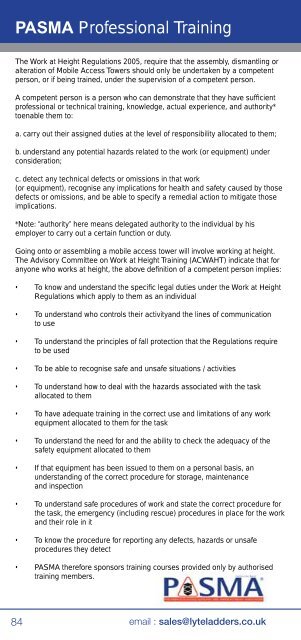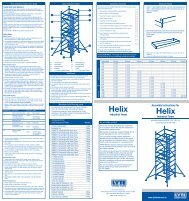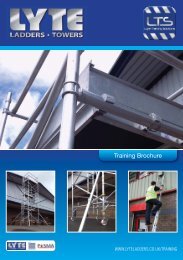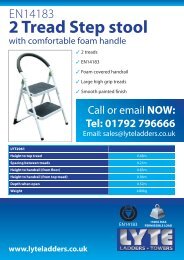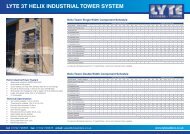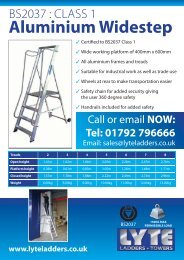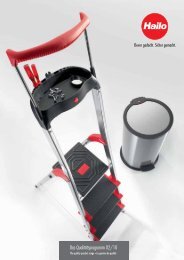Lyte product brochure - Lyte Ladders
Lyte product brochure - Lyte Ladders
Lyte product brochure - Lyte Ladders
Create successful ePaper yourself
Turn your PDF publications into a flip-book with our unique Google optimized e-Paper software.
PASMA Professional Training<br />
The Work at Height Regulations 2005, require that the assembly, dismantling or<br />
alteration of Mobile Access Towers should only be undertaken by a competent<br />
person, or if being trained, under the supervision of a competent person.<br />
A competent person is a person who can demonstrate that they have suffi cient<br />
professional or technical training, knowledge, actual experience, and authority*<br />
toenable them to:<br />
a. carry out their assigned duties at the level of responsibility allocated to them;<br />
b. understand any potential hazards related to the work (or equipment) under<br />
consideration;<br />
c. detect any technical defects or omissions in that work<br />
(or equipment), recognise any implications for health and safety caused by those<br />
defects or omissions, and be able to specify a remedial action to mitigate those<br />
implications.<br />
*Note: “authority” here means delegated authority to the individual by his<br />
employer to carry out a certain function or duty.<br />
Going onto or assembling a mobile access tower will involve working at height.<br />
The Advisory Committee on Work at Height Training (ACWAHT) indicate that for<br />
anyone who works at height, the above defi nition of a competent person implies:<br />
• To know and understand the specifi c legal duties under the Work at Height<br />
Regulations which apply to them as an individual<br />
• To understand who controls their activityand the lines of communication<br />
to use<br />
• To understand the principles of fall protection that the Regulations require<br />
to be used<br />
• To be able to recognise safe and unsafe situations / activities<br />
• To understand how to deal with the hazards associated with the task<br />
allocated to them<br />
• To have adequate training in the correct use and limitations of any work<br />
equipment allocated to them for the task<br />
• To understand the need for and the ability to check the adequacy of the<br />
safety equipment allocated to them<br />
• If that equipment has been issued to them on a personal basis, an<br />
understanding of the correct procedure for storage, maintenance<br />
and inspection<br />
• To understand safe procedures of work and state the correct procedure for<br />
the task, the emergency (including rescue) procedures in place for the work<br />
and their role in it<br />
• To know the procedure for reporting any defects, hazards or unsafe<br />
procedures they detect<br />
• PASMA therefore sponsors training courses provided only by authorised<br />
training members.<br />
84 email : sales@lyteladders.co.uk


